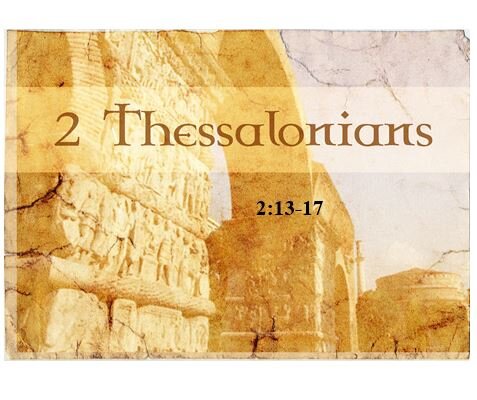BIG IDEA:
PERILOUS END TIMES CALL FOR STEADFASTNESS ON THE PART OF THE ELECT (WHOM GOD LOVES AND STRENGTHENS)
INTRODUCTION:
William Hendriksen: In dividing the material of II Thessalonians into sections or thought units it is therefore not an error either to consider 2:13-16 along with the preceding twelve verses of chapter 2, or along with the contents of chapter 3. There is overlapping here.
John Stott: Stability is a coveted quality in every sphere of human life. Governments talk about stabilizing the economy. Builders endeavour to construct stable houses, and carpenters stable furniture. Aircraft and ships have “stabilizers,” to counteract turbulence and the ocean swell. And we admire people who have a stable personality, character and convictions.
The New Testament says much about Christian stability. In Paul’s first Thessalonian letter he declared: “now we really live, since you are standing firm in the Lord” (3:8). And here in his second letter, having urged them not to become “easily unsettled” (2:2), he is about to issue the exhortation, So then, brothers, stand firm . . . “ (15). In the words of Jesus we are not to be “like reeds shaken by the wind”, but rather be rock-like and immovable. Moreover, the New Testament identifies the winds which threaten our stability, and against which we are to take our stand. The first is opposition or persecution (1 Thess. 1:4-6; 3:2-4), the second is false teaching (e.g. 2 Thess. 2:2-3), and the third is temptation. Temptations are like strong gusts of wind which threaten to blow us over. That is why Paul prays that God will “establish” the Thessalonians, so that they will be holy in God’s presence (1 Thess. 3:13, RSV).
Jerry Harmon: Standing Firm in Difficult Times
4 Reasons we must stand firm when trials come
I. God Chose You for Salvation
A. The Motive Was Divine Love
B. The Means Was the Work of the Spirit
C. The Manner Is Belief in the Truth
II. God Called You for Greatness
III. God Committed to You His Truth
IV. God Comforts Your Hearts
A. His Comfort Is Continual
B. His Comfort Is Personal
C. His Comfort Is Purposeful
I. (:13) APPRECIATING THE PROCESS OF DIVINE ELECTION
A. Obligated to Give Thanks
“But we should always give thanks to God for you”
F.F. Bruce: Resumption of the introductory thanksgiving of 1:3
B. Election Rooted in God’s Initiating Family Love
“brethren beloved by the Lord”
Hiebert: That “Lord” here means “the Lord Jesus Christ” is clear from the following verses where He is distinguished from the Father. This change in the person said to love them is evidence that for Paul the two designations were equivalent. The reference to the Lord Jesus (2:8) here as the one loving them seems due to the foregoing picture of Him as the invincible Judge of evil men. Men may hate and persecute them, but they can take courage from the fact that they are the objects of the love of the Lord who will triumph over all evil.
C. Election Ordained by God’s Sovereign (and Unfathomable) Selection
“because God has chosen you”
D. Election Predating any Human Involvement
“from the beginning”
Charles Ryrie: a reference to the beginning of all things; i.e., from before the world began. This is an idea which is regularly found in Paul’s writings (1 Cor. 2:7; Eph. 1:4). God had the choice of His people in mind in eternity past.
E. Election Destined for God’s Ultimate Blessing
“for salvation”
F. Election Dependent Upon a Process that Combines
Divine Preservation and Human Perseverance
1. Divine Preservation and Purifying
“through sanctification by the Spirit”
2. Human Perseverance and Responsibility
“and faith in the truth”
II. (:14) UNDERSTANDING THE PURPOSE OF GOD’S CALLING
“And it was for this He called you through our gospel, that you may gain the glory of our Lord Jesus Christ.”
Hiebert: Their call did not immediately transport them to glory but set them on the way to the obtaining of “the glory of our Lord Jesus Christ.” “Glory” is the splendor and honor which now belong to our Lord as exalted at the right hand of God. That glory will be shared with His saints at His return (1:10-12).
III. (:15) STANDING FIRM IN THE TRADITION OF TRUTH
“So then, brethren, stand firm, and hold to the traditions which you were taught, whether by word of mouth or by letter from us.”
F.F. Bruce: Other kinds of tradition are referred to with disapproval in the NT. Jesus rebuked some of his contemporaries because, as he said to them, “you leave the commandment of God, and hold fast the tradition of men” (Mark 7:8). Similarly, the false philosophy against which the Colossian Christians are put on their guard is described by Paul as “the tradition of men” (Col 2:8). But it is not tradition as such, but false, inadequate or outmoded tradition, that is deprecated. The tradition of Christ shares his truth, his adequacy and his abiding vitality.
IV. (:16-17) RESTING IN THE COMFORT AND ENCOURAGEMENT OF GOD’S LOVING CARE
“Now may our Lord Jesus Christ Himself and God our Father, who has loved us and given us eternal comfort and good hope by grace, comfort and strengthen your hearts in every good work and word.”

